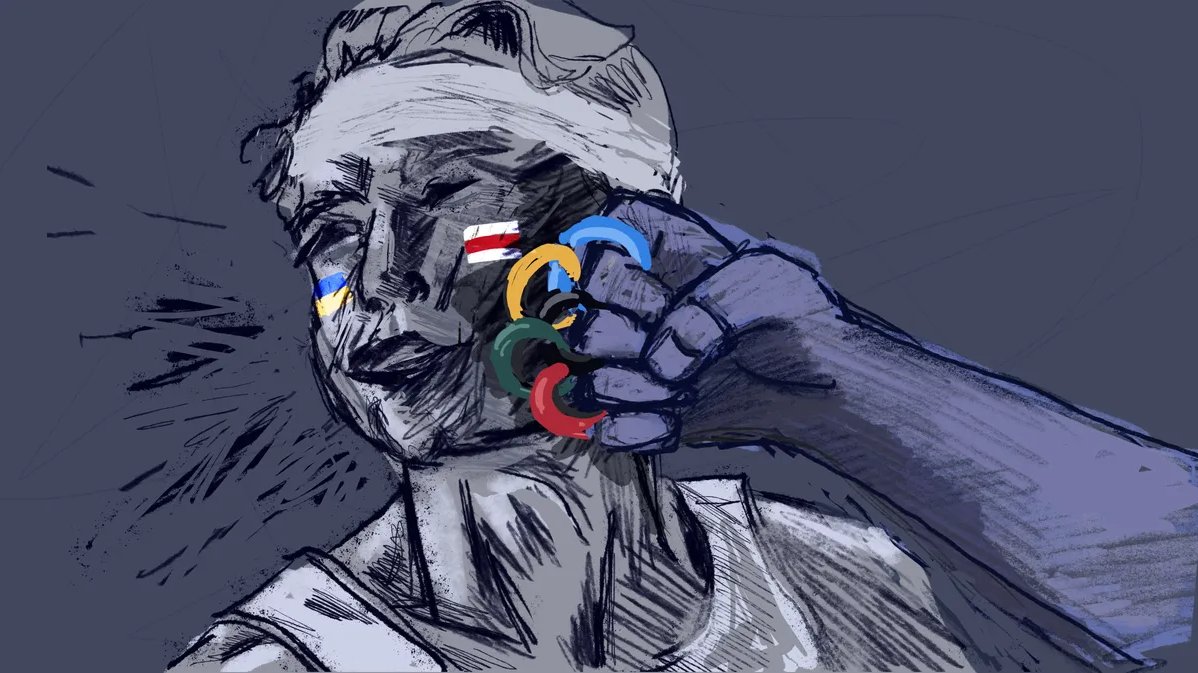Chapter 1, in which
Belarusian athletes attend ‘Satan’s Ball’
“You’ve never tasted such cognac in your entire life! It’s a hundred years old and terribly expensive,” Alyaksandar Lukashenka said as he handed out glasses to athletes, and they gladly accepted the drinks.
There was black caviar, Moёt, and expensive vodka on each table. The guests felt relaxed, danced, and recorded videos for their social media.
That evening in December 2019, the athletes and the president were celebrating the opening of the Lebyazhy restaurant, a haughty and scandalous establishment in Minsk. It had become scandalous even before it was opened, as businessman Pavel Bely, a player from the presidential ice hockey club, built it right in the middle of a nature reserve on Lukashenka’s permission, thus breaching national environmental law.
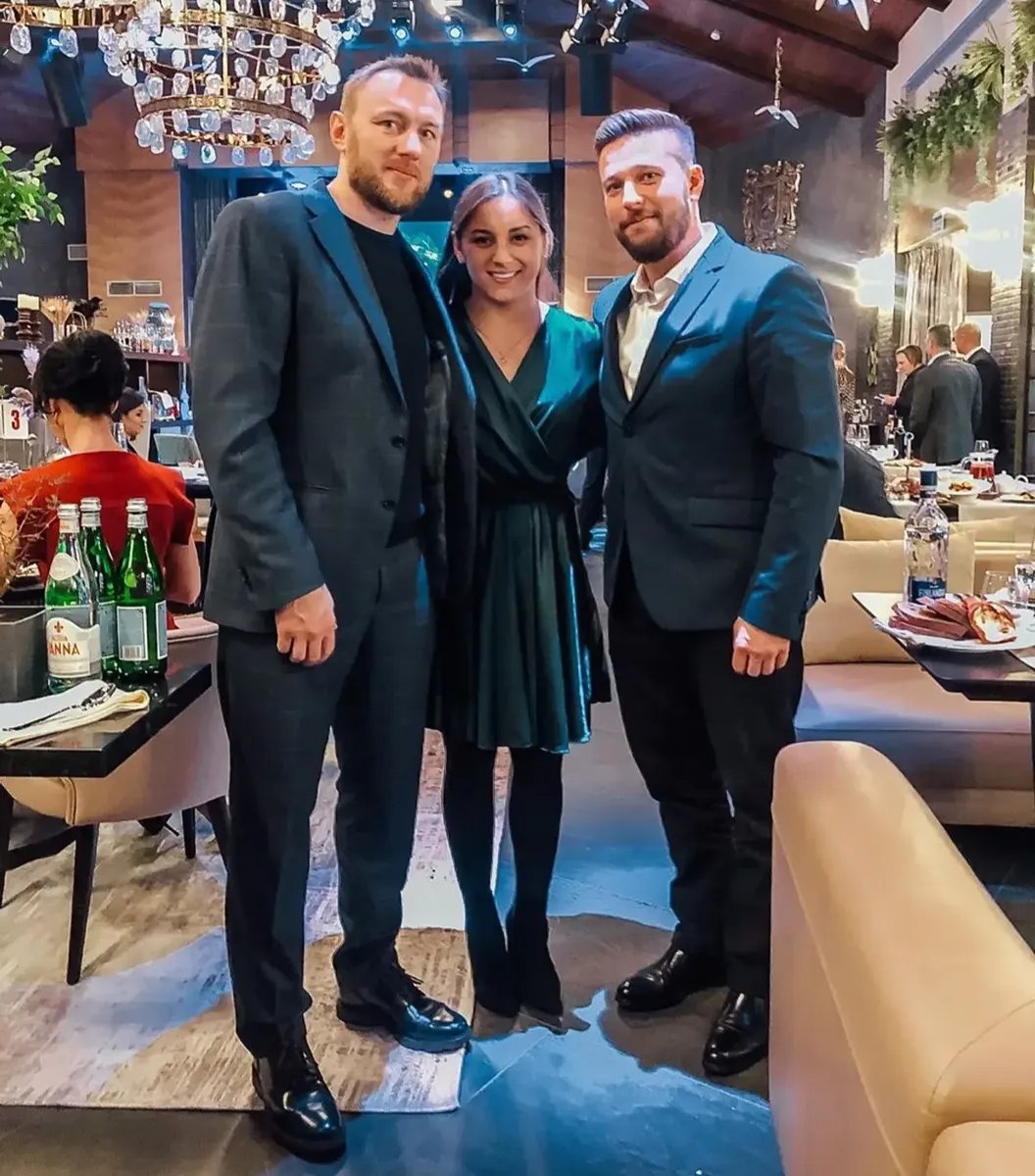
Former members of the Belarusian national ice hockey team Kanstantsin Kaltsou and Yaraslau Chuprys, and wrestler Maryia Mamashuk at the opening ceremony of the Lebyazhy restaurant. Photo: social media
For many athletes, this wasn’t the first party that the president invited them to. None of them thought too much at the time about the political climate in the country or about what kind of a president Lukashenka was. The situation changed dramatically in less than a year, in August 2020. Shortly after the presidential election, Belarus saw mass popular protests followed by a violent government crackdown on those who dared speak out against it. It was time for athletes to pick a side.
On the election day, on 9 August 2020, Sambo wrestler Stsiapan Papou, 36, a world and European champion, was at a training camp. Frankly speaking, Papou had been just like any other athlete in the country all his life — that is, did not care much about politics and was more concerned with competitions and achievements.
On the same day, the Internet was cut off in Belarus. “And when we went online again three days later, we saw that there was horrible violence in the country at the time. People were beaten up and shot! That was the first time when I wanted to know an alternative standpoint and began looking for some other sources apart from government ones.”
“And the more I was getting absorbed in that, the more it was making my hair stand on end from what had been happening in the country over all those years.”
“Going online between training sessions, I saw masked soldiers beat people at protest marches. I would look at that and feel I just couldn’t turn away and continue my training as if I hadn’t seen that,” Papou says.
It felt scary to join the protesters. “But courage comes to you step by step,” says Papou. “At first, I feared to write Lukashenka’s name on social media, but then I saw an athlete say, ‘Lukashenka is not my president!’, then another, ‘I didn’t vote for him!’, then another… And in the end, I also began saying openly that I wouldn’t put up with this cannibalistic regime and then going to marches.”
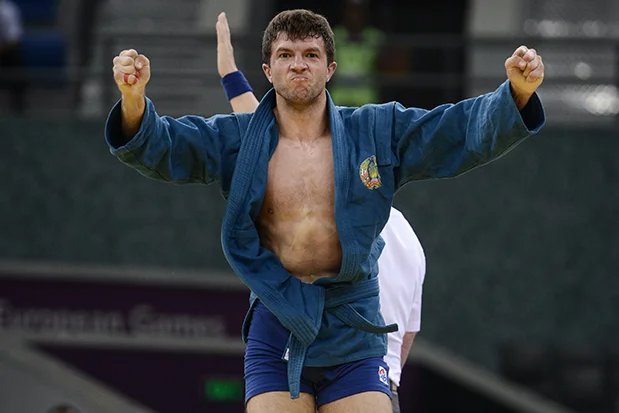
Belarusian sambo wrestler Stsiapan Papou. Photo by: International Sambo Federation
In late August 2020, Papou was summoned to the coach office. He ran up the stairs to see Deputy Sports Minister Mikhail Partnoi and KGB officers in civilian clothing in the room. “They locked me up and demanded that I stop showing up at protest marches. They threatened me, reminded me that I have a wife and little daughters…”
Papou did not yield to the threats and walked out of the office. Soon afterwards, he began receiving text messages with rape threats from strange numbers. Nevertheless, the wrestler signed an open letter calling for fair elections and against violence. In just a few months, it was signed by about 2,000 Belarusian athletes, coaches, massage therapists, and other members of the sports community.
Chapter 2, in which
Athletes are ready to lose everything in order to see some change
Andrei Krauchanka, a Belarusian decathlete, wept after winning gold at the European Athletics Indoor Championships in Paris in 2011, when he was 25.
He came to the tournament with an Achilles tendon injury. In the final event of the men’s heptathlon competition, a 1,000-meter race, he scored enough points to become champion.
Krauchanka was the only Belarusian to win a medal for his country, and what is more, it was a gold one. Fans threw him a Belarusian flag from the stands, which he picked up and ran a lap of honour bare-chested, “purely on adrenaline”. Then he raised the flag over his head and, posed with a wide grin for TV cameras from all over the world.
“I was then filled with the sense of euphoria from being the fastest, the most enduring, and the jumpiest in Europe. The French later wrote to me: ‘Andrei, you are a real warrior and a tough competitor.’”
“Unforgettable moments,” he said.
In summer 2020, the 34-year-old athlete was recovering from a series of surgeries on his Achilles tendon and planned soon to resume training and prepare for his next Olympics.
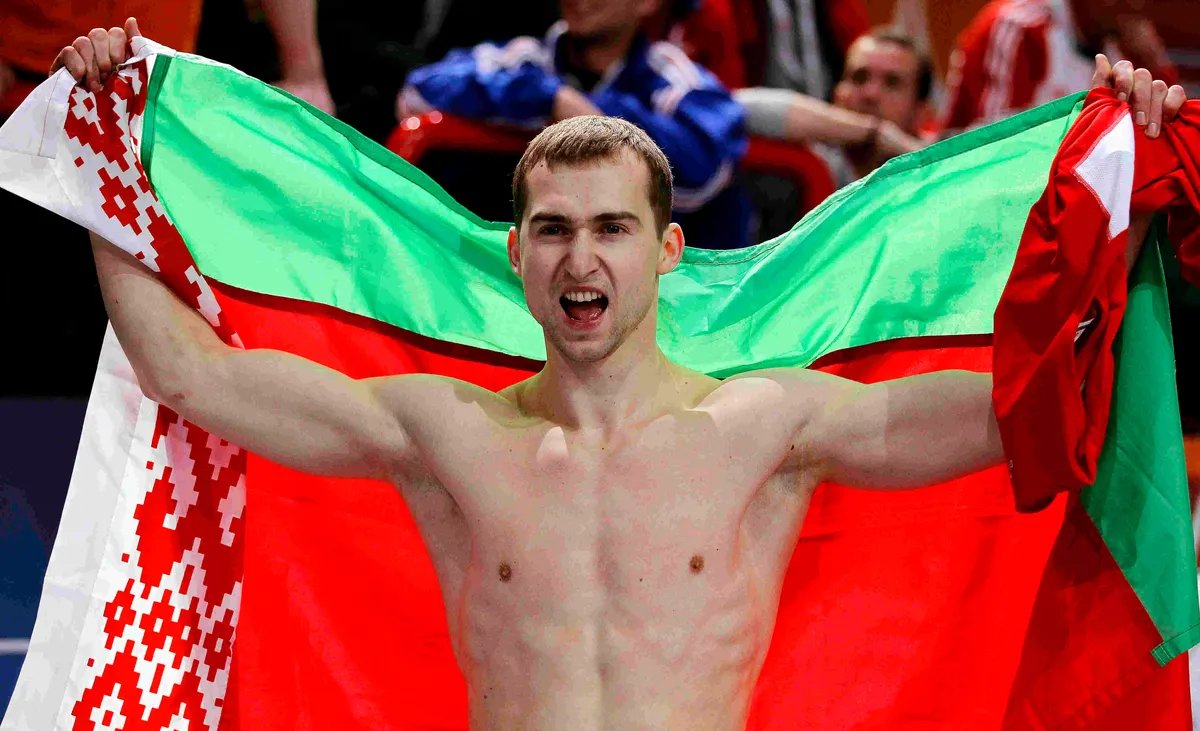
Andrei Krauchanka celebrates his victory in the men’s heptathlon event at the European Athletics Indoor Championships. Paris, 2011. Photo by: EPA / KERIM OKTEN
“When I learned that all of Lukashenka’s opponents are in jail and that people were beaten in the street and raped at detention centres, I realised that I had to fight together with them, even though I was perfectly aware that protesting against the authorities in a totalitarian country meant saying goodbye to your career. I was prepared to lose everything to see some change at the time — and I did lose everything. Very soon, I really lost everything that I had achieved and won in Belarus. I was confronted with this choice: if I wanted to remain a national team member, I had to revoke my signature from the letter for fair elections. I refused, and I was sacked. They kicked me out of the national team and the national Olympic training centre. It wasn’t about being courageous, it was about having a clear conscience. My coach always taught me that competition must be fair.”
In November 2020, he was arrested for ten days for joining a march and sent to a detention facility. “I was detained at a parking lot right in downtown Minsk. They pulled me out of my car,” Andrei recalled on Instagram. “My lawyer was unaware where I was and what happened to me for four days. I didn’t receive a single parcel while I was in jail.
“I remember each day I spent there. I remember the cell, and I remember the lights always on. Remember how we had to crawl on all fours and sleep right on the floor.”
While Andrei was in jail, he missed his daughter’s birthday and contracted COVID. “But at least I came home, while hundreds of Belarusians were given real jail time, and 357 of them have been recognised as political prisoners. What frightens me is that arrests have become routine, and real people are behind bars right now. These are their real lives. The broken lives of their families. Nobody will return this time to them. You’ll never be able to make up for it.”
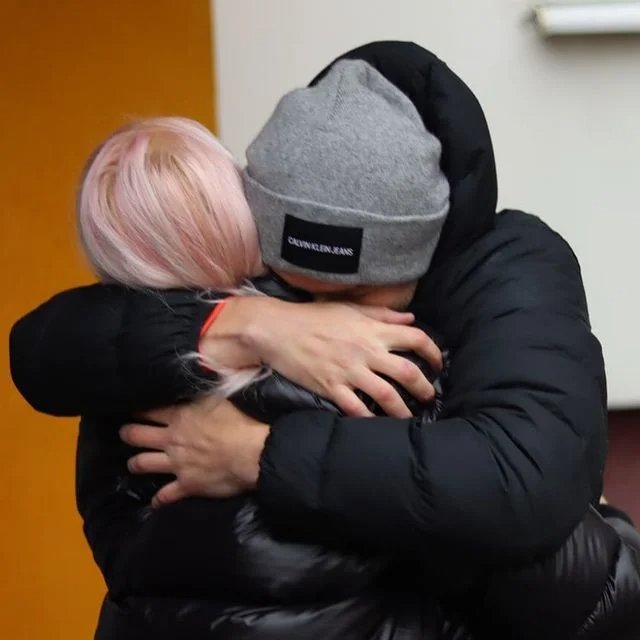
Andrei Krauchanka after being released from the detention facility in Minsk. Photo: Instagram
In April 2021, still in Minsk, Krauchanka auctioned off that very gold medal he won at the 2011 European championships and went on a ten-day hunger strike to draw attention to political repressions in Belarus. “I know that the families of political prisoners are going through really hard times now,” he explained on Instagram. “I’ve put up my medal for auction to help them. I won it while competing with a serious injury. It hurt at the time. But it hurts a hundred times more now.”
Andrei lost eleven kilos over the first eight days of his hunger strike. Then he felt unwell and cut it short. The authorities offered no response to his gesture.
Chapter 3, in which
Everything reached the point of no return
“Mum, I was at the march,” Karyna Kazlouskaya, a 19-year-old Belarusian archer, told her mother while the family was preparing to have dinner that evening.
“Oh, how stupid,” the mother answered, stopped laying the table, and walked out to the bathroom. She returned after a while, hugged her daughter, and said, “Proud of you.”
From then on, Karyna joined protest marches almost every evening. She would always switch off her phone so that she could not be tracked. “Everyone was afraid, and me too, but I thought I was an athlete, I had strong legs, and I’d be able to run away,” she says. “I understood it was very likely that I might lose my career, and nothing would change in the country, and yet I still had some tiny hope that perhaps something might change, after all.”
A year later, in 2021, Kazlouskaya qualified for the World Cup and was the best on her team there. This was her trump card. “Even though the director of the national Olympic training centre didn’t want me at the Olympic Games in Tokyo, because he knew about my position, it was really hard for him to expel the team’s number one,” she says.
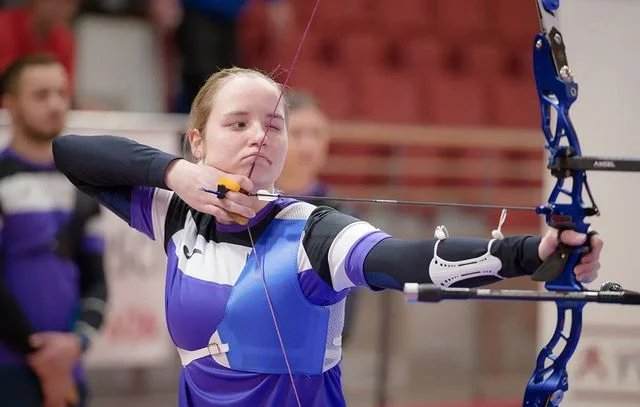
Belarusian archer Karyna Kazlouskaya. Photo: Instagram
At the Tokyo Olympics, Kazlouskaya’s team came in fourth, losing bronze to the Germans. That result is the best in the sport in Belarus’s history. Except for happy parents meeting Karyna with flowers at the airport, no more fans came to greet her. Only the director of the national Olympic training centre, who was present there for purely formal reasons, “muttered some congratulation through his teeth”.
A year later, in May 2022, Karyna Kazlouskaya wrote on her Instagram account: “Sacked. I am 21, and my Belarusian career is over for me now.”
Karyna tells me she was crying while writing this post, “because I felt that my life was going to change completely”. To avoid drawing special services’ attention to herself, she left Belarus in secret, without even saying goodbye to her family and friends.
Chapter 4, in which
Other athletes said, ‘Guys, I am with you, but I need to get paid’
While some Belarusian athletes signed the letter for fair elections and against violence, risking their careers and freedom, others, on the contrary, signed a pro-regime letter, which they circulated in November 2020 as a counterbalance.
The authors of this pro-regime letter proclaimed themselves “a voice of the genuine sports community”, insisting that “sports and politics don’t and shouldn’t mix.” However, nobody knows up to this day who actually wrote it.
“Our duty is not to make political statements but win on sports arenas […] We want to defend our dream — to win medals of Olympic Games and world and European championships! This is the meaning of life for us!” says the letter signed by both very young athletes and Olympic Games champions and participants, as well as their coaches.
Papou recalls that many members of his team refused to sign the letter for fair elections. They said, “I am just an athlete, I won’t sign any letters, I’ll be training, leave me alone!” But they did sign the pro-regime letter. Papou says some of his teammates told him and other opposition athletes, “Guys, I am with you, but I need to get paid. They warned me that if I don’t sign the pro-government letter, they’ll kick me out, and I signed it. But heck, I am with you, I am against all of this.”
“In fact, none of them supported the lawlessness that was unleashed at the time,” says Stsiapan Papou. “The more or less decent ones tried to remain evasive and keep a low profile, and others supported Lukashenka.”
At the same time, a number of “quite mediocre athletes” saw the situation as a perfect chance to take advantage of it — “quickly have a competitor removed for their opposition activities by libelling and slandering them, and occupy their place,” Papou says.
For example, Papou’s teammate Yury Rybak, a sambo wrestler, “has become a hangman, who displayed loyalty to the authorities at the right moment in order to get what he wasn’t normally entitled to.”
Rybak himself did not respond to my request for comments.
As some athletes said, Rybak, accompanied by security officials, visited numerous athletes opposing violence, and of course, he signed the pro-regime letter himself. He also described his colleagues who stood up against the regime as “traitors.”
In 2021, Rybak was appointed head coach of Belarus’s national sambo team.
Chapter 5, in which
Athletes become deliverymen and freight handlers
Almost all athletes who spoke up against the regime had to leave Belarus. “Most of them were unable to continue their careers in sports,” says Belarusian swimmer Aliaksandra Herasimenia, a world and European champion and a 2012 Olympic silver medallist. Almost none of them had professions other than sport-related ones. “Therefore, some have taken up jobs as coaches or massage therapists at their new places, and others had to work as freight handlers, deliverymen, or taxi drivers.”
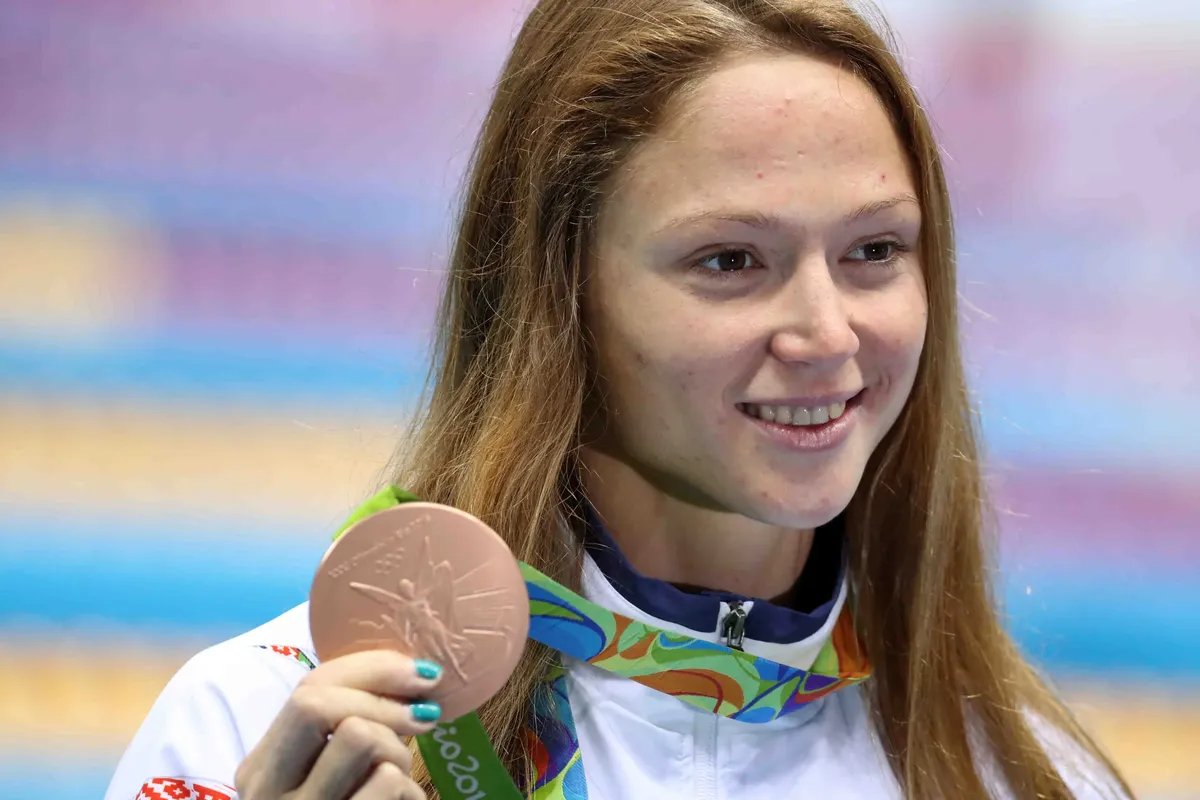
Belarusian swimmer Aliaksandra Herasimenia. Photo by EPA / ESTEBAN BIBA
Stsiapan Papou was expelled from the national sambo federation in December 2020. He was stripped of his presidential stipend, he was pressured, and he finally had to leave Belarus together with his family and change profession. Papou is currently living in Poland, working as a grappling and self-defence coach, and studying computer programming. He says he is not really a fan of sitting in front of a computer for too long, and yet he has to do that, as this is one of the few available ways for him to make a living.
Track and field athlete Andrei Krauchanka did not want to leave his country. “However, I realised that staying in Belarus was dangerous for me,” he says.
“I want to kiss my wife and see my kid grow up rather than be jailed.”
He continued to oppose the regime until the end of summer in 2021, but then he also left.
Andrei, his wife Yana Maksimava, a 34-year-old track and field athlete, and their daughter have been granted political asylum in Germany and live there in a small town. “None of international sports organisations have offered any support. I had to feed my family, and therefore I dropped any plans to continue my sporting career,” Krauchanka says. “Yana is not willing to give up her dream to take part in the 2024 Olympics. However, she has so far been unable to settle the paper problems at the new place. Everything depends on international federations, but wherever we’ve appealed, no one has replied.”
In 2022, the status of Belarusian athletes abroad became even more uncertain. When Russia invaded Ukraine in 2022, Belarus acted as a co-aggressor in the conflict. Therefore, immediately after the war was started, the IOC barred all Belarusian and Russian athletes from participating in international competitions.
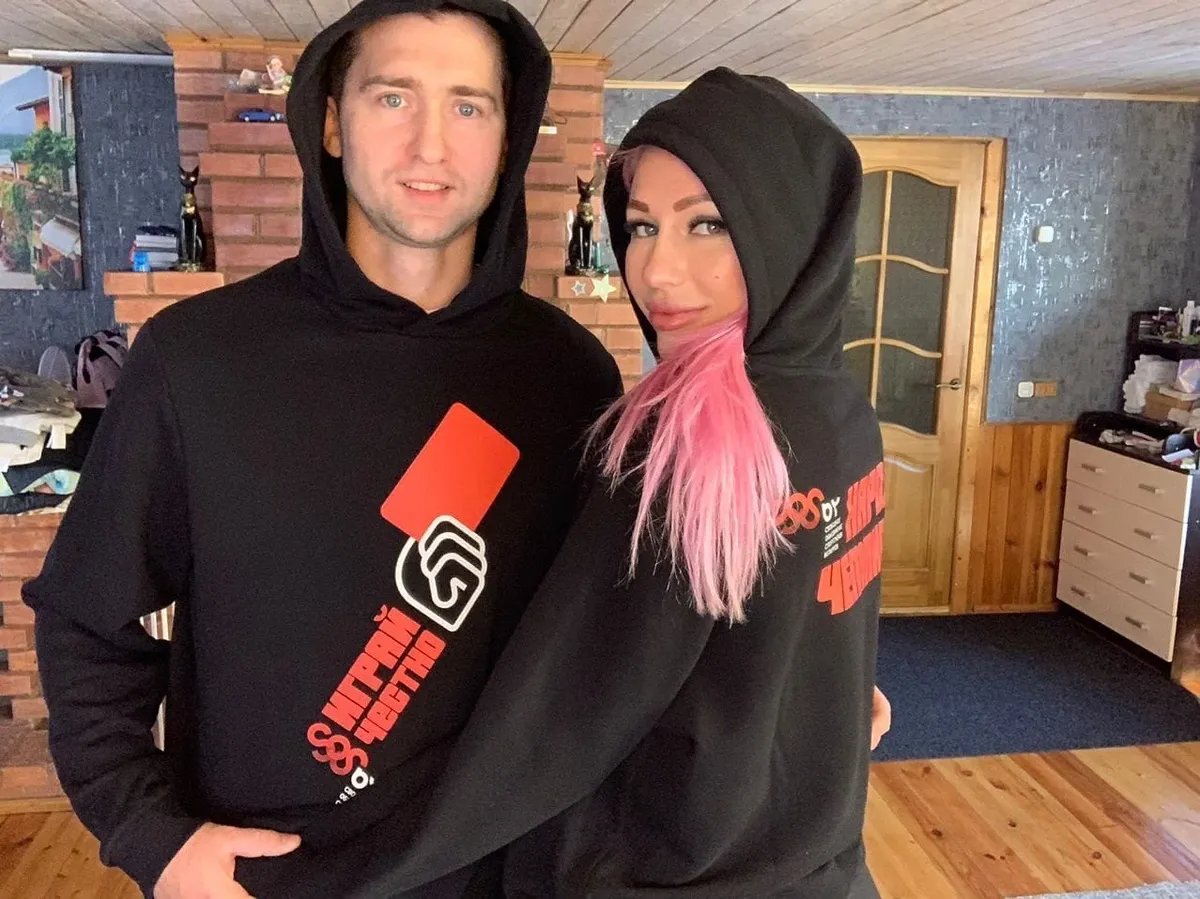
Andrei Krauchanka and Yana Maksimava. Photo: social media
“Now that Belarus is banned, it’s been a really tough time for us,” says Andrei Krauchanka. “Nobody wants to bother themselves with any nuances: you’ve been banned, period. If you’re Belarusian, then you don’t compete, no matter if you have participated in protests and been jailed.”
Herasimenia says changing sport nationality has never been an easy procedure. “An athlete’s ‘native’ federation was supposed to facilitate this transition, and the two federations had to conclude an agreement.” However, in the current force majeure situation and without the IOC’s support, this undertaking has proven impossible for Belarusian athletes, especially those who are not stars in their sport. “Hardly anyone would like to take up an ordinary athlete, even if they were young and promising and showed fairly good results in their country,” she says. “Because how can you assess how promising they are?
“If their federation advocates for them, it’s one thing. But if an athlete sends a letter to a foreign sports federation on their own, nobody would simply answer them.”
Even if an athlete manages to change their sport nationality, they are supposed to observe a waiting period, during which they cannot compete. This period lasts from one to four years in different sports. For instance, it is three years in athletics. During this time, a sports club is supposed to take this athlete under its wing and cover their expenses.
“It costs a lot of money to train,” says Andrei Krauchanka. “We are starting our life here from square one, so it’s hard for us to invest in Yana as long as we don’t know whether she’ll ever be allowed to compete. She is training hard every day now, despite being absolutely ignored by the IOC and other organisations. She is not that enthusiastic about it anymore, and she is really frustrated. But you have to pay for everything.”
Archer Karyna Kazlouskaya is one of the very few Belarusian athletes who have succeeded in continuing their sporting career in a new country. After she moved to Poland in May 2022, she was granted a Polish residence permit based on a fast-track procedure with World Archery’s facilitation. To be entitled to this support, Karyna signed a statement that she is opposed to Russia’s war against Ukraine, is not a Russian agent, and does not receive financing from Belarus and Russia. Kazlouskaya “served one year of sporting quarantine,” which expired in February 2023. Since then, she has already competed in the 2023 Archery World Cup as a member of Team Poland.
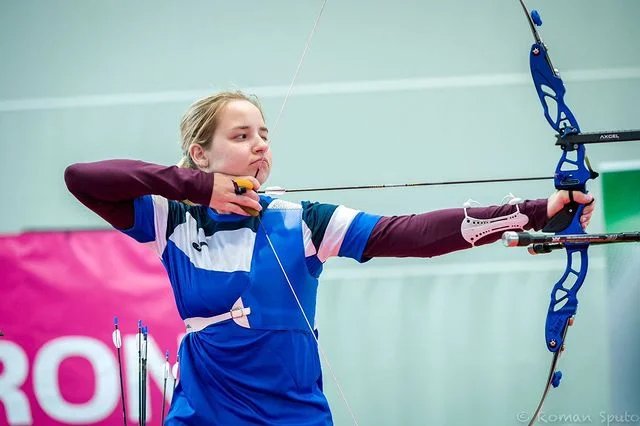
Karyna Kazlouskaya at a youth archery tournament in Piaseczno, Poland. Photo: Instagram
Chapter 6, in which
Nobody cares about ambitions anymore
“I keep training now just to get paid. It’s not about achieving any ambitions anymore,” says a 24-year-old athlete from Belarus, who agreed to speak to me on the condition of anonymity. In 2020, she “maintained neutrality” to be able to continue building her sporting career in the country. The girl dreamed of taking part in the Olympics and, along with her coach, pinned high hopes on the 2024 Games.
Now before going to work, she routinely deletes call, text, and browsing history on her phone.
The athlete says that, when her colleagues joined the protests in 2020, she thought, “Well, I feel sorry for everyone, but I don’t have to sacrifice my career for that. You only live once.”
“I’ve been slaving away since I was five. When my coach said that I showed promise, my mum even quit her job to help me,” the girl says. “When all this massacre and lawlessness started, I was even thinking of signing the athletes’ letter for fair elections, but then I changed my mind. I thought, why should I devote my own life to that struggle? And besides, will my signature change anything? I’m not sure. But my mum would certainly be upset if I am kicked out and all her work goes down the drain.”
Now she is living in the hope that “everything will somehow work out, some solution will be found” and the athletes will be allowed to compete. We spoke in February 2023, when the IOC had not yet decided what to do with Belarusian athletes.
“Life here has changed a lot. A denunciation campaign is thriving in the sports community. Anyone might rat on you out of envy, saying that you’re not happy with the potato king [alluding to Lukashenka — translator’s note]. You’re under stress all the time. Because it’s become much more important to be loyal to the authorities than to be professional. I occasionally discuss something with my friends and say what deep shit we’ve found ourselves in, and then I come home and berate myself: ‘Did you really need to speak that way? What if someone rats on you tomorrow?’ Of course, I’ve been thinking of leaving, but when I look at what happened to some of our guys, I see that many of those who protested here have been lost abroad. The IOC doesn’t help even them, who fought dictatorship so desperately. They’ve been left to their fates. Something they were trying to achieve all their lives is in tatters. Yes, their conscience is clear, but this is hardly worth a ruined life.”
“What did they get in exchange for their conscience? Nothing,” Stsiapan Papou argues referring to his former fellow athletes who stayed back home. “Belarus found itself isolated from the civilised world in 2022 and early 2023. They shut everyone’s mouths. They earlier remained silent because they held onto their salaries, but now that all-out dictatorship is raging in the country, being slaves is no longer their choice but simply the only way to exist there.”
At the same time, only the few who belonged to Lukashenka’s inner circle have received “really great perks”, Papou says. “You can hardly say that someone greatly benefited from that. True, before the war, some did participate in European or world championships instead of those who were repressed. After all, coaches stopped taking to competitions those who opposed the regime at the time, preferring weaker ones, as long as they remained silent. And those who publicly backed the authorities even got some extra pay. But all of that is just crumbs from the rich man’s table.”
Chapter 7, in which
Refusal to compete with Russian athletes would hurt Ukrainians
The International Olympic Committee suggested in January 2023 that it could admit individual athletes with Russian and Belarusian passports to international competitions as long as they did not support the Ukraine war.
This prompted human rights experts from the UN to urge the IOC “to go further, ensuring the non-discrimination of any athlete on the basis of their nationality”. Two special rapporteurs for the UN Human Rights Council said that, in their opinion, “no athlete should be required to take sides in the conflict.”
In March 2023, the IOC recommended that international sports federations admit individual neutral athletes from Russia and Belarus to some international sports competitions, provided that they do not support the war and are not contracted to Russian or Belarusian military or national security agencies.
The IOC made it clear that, to compete as neutral athletes, they do not even have to openly condemn the Ukraine war, and the international community would be satisfied if they do not actively support it by making relevant public statements, including on social media, or participating in pro-war demonstrations or events, or displaying symbols, such as the Z-symbol, supporting the war.
At the same time, the IOC kept the ban on teams of athletes with Russian and Belarusian passports, without providing any explanations for this selective approach.
That decision was not welcomed in Ukraine, to put it mildly. “Russia won 71 medals in Tokyo Olympics. 45 of them were won by athletes who are also members of the Central Sports Club of the Russian Army. The army that commits atrocities, kills, rapes, and loots. This is whom the ignorant IOC wants to put under white flag allowing to compete,” Ukrainian Foreign Minister Dmytro Kuleba wrote on Twitter.
Ukrainian President Volodymyr Zelensky invited IOC President Thomas Bach to Bakhmut, so that he could “see with his own eyes that neutrality doesn’t exist” during a war. Bach replied that he had been to Ukraine in summer 2022 and had no plans to travel there again anytime soon.
On April 12, the Ukrainian Youth and Sports Ministry issued an order banning Ukrainian national teams from participating in international competitions if athletes from Russia or Belarus also participate in them. The Ukrainian government warned that sports federations that did not comply would be deprived of their national status.
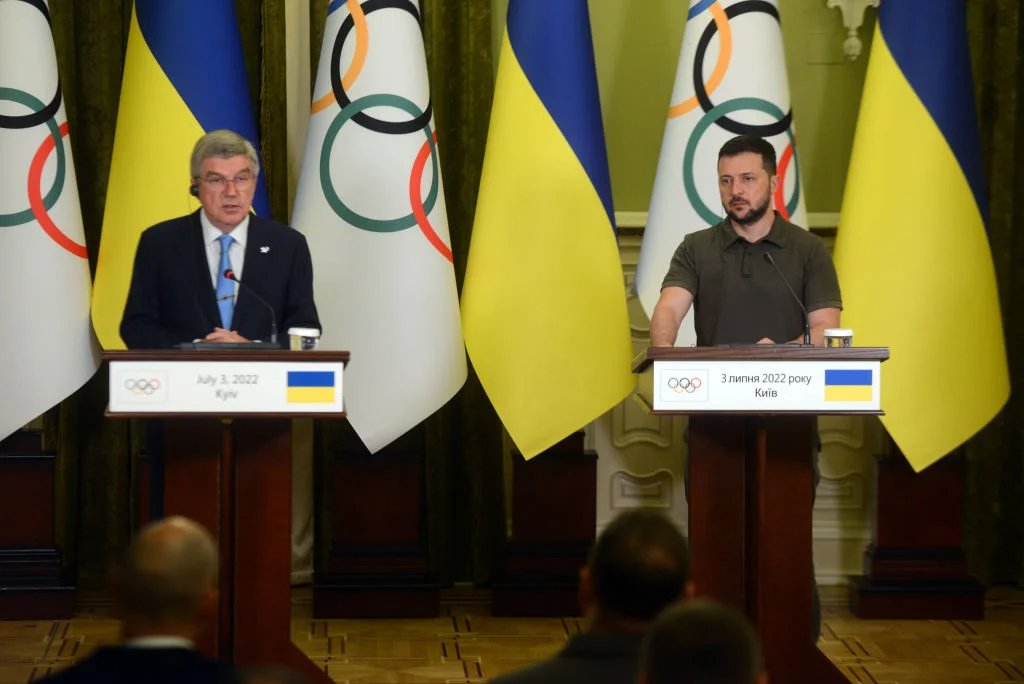
Ukrainian President Volodymyr Zelensky and IOC President Thomas Bach at a press briefing in Kyiv on 3 July 2022. Photo by: Yevhen Kotenko/ Ukrinform/Future Publishing / Getty Images
The Sports Ministry insisted that Ukrainian athletes understood and accepted the decision. Deputy Sports Minister Matviy Bidny said he “didn’t hear any Ukrainian athlete say that they’d like to share the same playfield with a Russian or a Belarusian.”
The IOC responded to this by saying that it was not up to governments to decide which athletes could participate in which international competitions. Despite Ukraine’s reaction, the IOC said that, if the Ukrainian government forbade its athletes to compete with Russians and Belarusians, this decision “would hurt only the Ukrainian athlete community and the National Sports Federations, and in no way impact the war.”
What is noteworthy is that, despite the IOC’s recommendation that athletes from Russia and Belarus be barred from international competitions in 2022, Ukrainian athletes regularly had to compete with neutral athletes from those countries throughout that year.
This happened when some international sports federations issued special permissions for that. True, this put some athletes in awkward situations from time to time.
In January 2023, following a game in Ligue 1, the top French professional football league, Alexander Golovin of AS Monaco from Russia and Ruslan Malynovsky of Olympique de Marseille from Ukraine hugged each other as their teams were leaving the pitch. Malynovsky later had to offer apologies.
“I understand that I should have bypassed him, but it just so happened that he approached and greeted me. After a game, all footballers shake each other’s hands, and I did it purely reflexively. In an individual sport, I wouldn’t even agree to play against a Russian athlete, as I fully support the suspension of Russians from international competitions.”
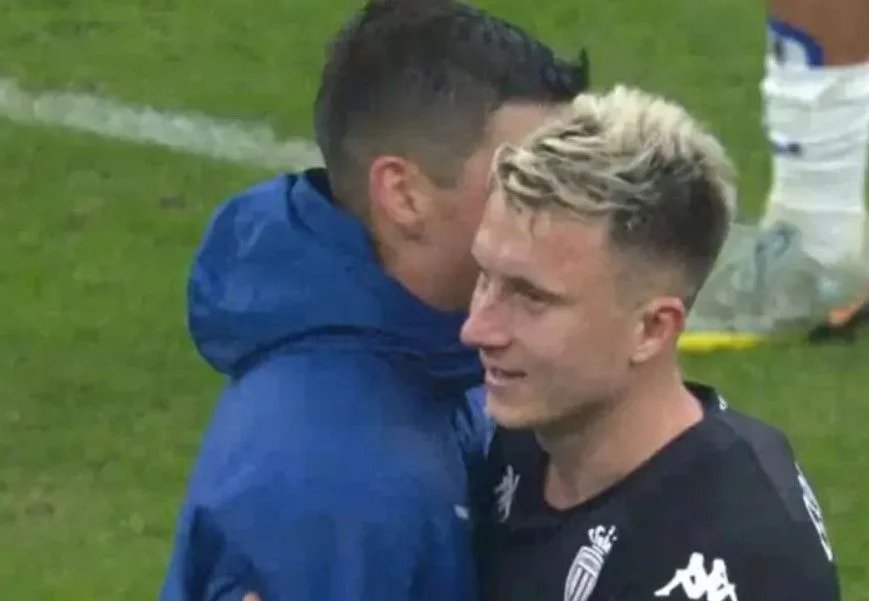
Alexander Golovin and Ruslan Malynovsky following a match between Monaco and Marseille. Screenshot
Chapter 8, in which
‘They remained silent, and now they’re going to the Olympics. You were dumb enough to speak out, and now you can’t go!’
“The IOC is now trying to devise a loophole to admit Belarusian and Russian athletes to the Olympics, but athletes that have stayed in Belarus will still represent the regime, even if they compete under a neutral flag,” Herasimenia says. “Therefore, their admission to international competitions is morally reprehensible. Those who have fought trying to defend the country’s future and then had to leave could be supported. But only them.”
Herasimenia herself joined the protests in 2020 and was one of the authors of the letter for fair elections, and then she had to leave her country the same year.
In December 2022, she was sentenced in absentia to 12 years in prison for calling for sanctions “and other actions aimed at causing damage to Belarus’s national security.”
This is how she explains her motives: “People view athletes as perfect creatures; they want to look like them. Of course, sport is about honesty, courage, will, and bravery. But if a person displays these merits only in sports but not in real life, it seems to me they’re bluffing. Are they worthy enough to fight for their rights?”
About 500 Belarusian athletes signed an anti-war declaration in 2022, most of them having left their country by the time, in which they demanded “the immediate cessation of the aggression unleashed by the Russian Federation against Ukraine using the territory of the Republic of Belarus.” Those were athletes who had opposed the regime in previous years, and they actually did even more than the IOC later required from their teammates who stayed at home. And yet Herasimenia says “it’s a big question whether the IOC’s new requirements will enable them to continue their careers, as these athletes are still barred from qualifying tournaments, and what is more, there are still no criteria for admitting them there.”
Belarusian athletes who had to leave their country are saying they would like to compete in the Olympics as part of “a refugee team”. History knows such a precedent: a refugee team performed under the Olympic flag at the 2016 Games in Brazil. It comprised ten athletes from South Sudan, Syria, the Democratic Republic of the Congo, and Ethiopia.
“We want at least several Belarusians who have spoken out to be able to appear at competitions. Even without a flag, but these would be really worthy people,” Stsiapan Papou says. “But if they admit Belarusians who kept silent when their people were butchered, and if they admit Russians who keep silent when the war is going on, this would be a slap in our faces, all brave and honest athletes.
I am sure the authorities would take credit for that. Silence is golden. ‘See, they remained silent, and now they’re going to the Olympics, and you were dumb enough to speak out, and now you can’t go’.”
“The IOC doesn’t help athletes who opposed the regime in any way, but it cares so much about Belarusians and Russians who haven’t done anything,” Andrei Krauchanka says with outrage. “I no longer understand what the point is.”
“The point is, the IOC is not a very noble organisation,” says sports journalist Alexei Durnovo. “It’s heavily dependent on money. Certainly, the IOC wouldn’t like Putin and Lukashenka to take advantage of the decision to admit their Olympians to international competitions to tell the world: ‘See, the world has swallowed what we’re doing’. But for financial reasons, the IOC really needs Russian athletes to compete in the Olympic Games. Russia generously sponsors numerous sports federations recognised by the IOC, and it makes sense that the IOC wouldn’t like to lose this money. That’s why they’re making these concessions.”
French President Emmanuel Macron has also spoken in favour of admitting Russian and Belarusian athletes to the 2024 Summer Olympics. “The Olympic Games will be held in Paris, and of course, as its host, he wants everything to be ended by the time, so that he could host the first Olympics following the crisis, which would symbolise freedom, the end of the war, and a new life,” says Durnovo. “And again, it’s also about money for the host country. It’s well known that Russians like to attend the Olympic Games. Local businesses would make money on guests. And what businesses earn would later become taxes. This whole story is not about caring for people and humanity but simply about cash.”
***
On April 13, 2023, World Triathlon said in a statement it supported the development of a pathway for independent neutral athletes with Russian and Belarusian passports to participate in its competitions. The organisation reaffirmed its “solidarity with Ukraine in the face of the ongoing war with Russia” and vowed to develop the necessary review procedures to make sure that only independent athletes holding neutral political views are admitted. The Ukrainian Triathlon Federation demanded that the Russian Triathlon Federation be expelled over Russia’s aggression. On top of that, the Russian Triathlon Federation’s president is Defence Minister Sergei Shoigu’s daughter Ksenia, and most Russian triathletes are officially affiliated with the Russian Army. However, the IOC does not see it as a problem.
The International Judo Federation followed suit and announced that it would allow athletes from Russia and Belarus to participate in its events as individual neutral athletes. The Ukrainian national judo team responded by boycotting the 2023 World Judo Championships in Doha.
Chapter 9 and final, in which
Russian sports officials outsmart everyone and take the Olympics away from themselves
Russian sports officials and some athletes interpreted the IOC’s initiative on their partial clearance for international competitions as an acknowledgment that the world cannot hold the Olympic Games without Russians. However, they said they would not accept the IOC’s compliance criteria. Olympic champion Svetlana Zhurova, currently a State Duma deputy, warned in commenting on the matter: “Such proposals are intended to make the public doubt: ‘What’s wrong with this athlete? Is he not a patriot? If the IOC admitted him, this means it knows that he doesn’t support the special military operation. This will seriously divide society.”
Deputy Prime Minister Dmitry Chernyshenko said that Russia does not need the Olympics to compete in which Russian athletes “will have to betray their country.”
“The IOC has issued a humiliating ultimatum to our athletes: if you want to participate in the Olympics, you essentially have to betray your country, to condemn it, and then we’ll admit you, but under a neutral flag and without your anthem. Do we really need such Olympics? We don’t want such Olympics,” said Chernyshenko, deciding for everyone.
Only a few Russian athletes made it understood that they were not prepared to accept that their years-long efforts were in vain and would actually agree to any terms to participate in international competitions.
Most of the athletes staying in Russia keep training silently in the hope that the problem would somehow be sorted out on its own, which some of them told me on the condition of anonymity.
Some of those who have already achieved something are quietly leaving Russia, hoping to continue their careers elsewhere, even though this is extremely hard to do now.
Russian sports journalist Viktor Kravchenko says, “Prominent Russian athletes were welcome in foreign clubs before February 24, but now nobody wants to see Russians or Belarusians. They’ve become a toxic asset for clubs. How can you be sure that none of those athletes would put on a T-shirt with Putin’s image one day? And besides, as concerns team sports, fans might be opposed to their club’s decision to sign them.”
“Athletes are hostages to this situation,” says Nadezhda Karpova, a footballer playing for Spanish club RCD Espanyol, one of the few athletes with a Russian passport who have openly spoken out against the Ukraine war. “They can’t go anywhere, and it’s a big question whether anyone would let them go. And they can’t protest the war, because they’ll be jailed. But many don’t want to support it. And so they’re just staying in this cage.”
Join us in rebuilding Novaya Gazeta Europe
The Russian government has banned independent media. We were forced to leave our country in order to keep doing our job, telling our readers about what is going on Russia, Ukraine and Europe.
We will continue fighting against warfare and dictatorship. We believe that freedom of speech is the most efficient antidote against tyranny. Support us financially to help us fight for peace and freedom.
By clicking the Support button, you agree to the processing of your personal data.
To cancel a regular donation, please write to [email protected]
